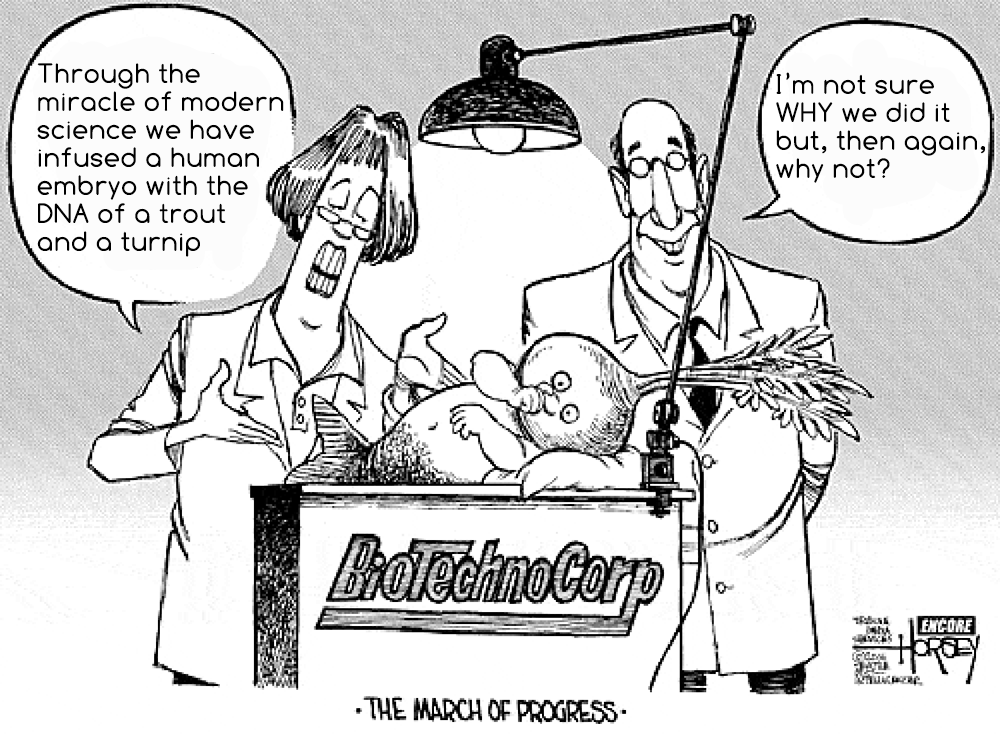aftermath
genetic engineering
Genetic Engineering is a recent and steadily growing threat to our world, already doing severe harm to the environment, humans and animals and capable of much worse. Its benefits are grossly exaggerated by unscrupulous people motivated by greed.

Genetics are a poor substitute for nature
Genetic Engineering is the direct manipulation of genes by humans to alter lifeforms in ways that may benefit humanity. Its main fields of application are agriculture (in the shape of genetically modified crops better known as GMOs) and medicine (in the shape of gene therapy).
It has come under fierce criticism from several quarters because it is an imperfect, highly speculative and experimental science that may cause massive damage to the environment and humanity.
First and foremost genetic engineering is not what it is cracked up to be. None of the miracles that were promised almost 50 years ago have materialized (no surprise to anyone with a proper understanding of evolution. In comparison with the way nature modifies organisms through evolution GE is just primitive and klunky tinkering). Even worse, it has fallen into the hands of people who are unable and unwilling to handle it responsibly and safely, because they are driven by greed.
Genetic engineering started in 1972, when DNA was transferred direct from one organism to another for the first time .
This led to extravagant claims from GE supporters. Disease and hunger would be eradicated, humans would be turned into flawless superheroes, pretty and smart, eternally young, immortal and omniscient. In a word, GE was going to make us gods.
Naturally these great expectations galvanized the business world. Corporations and individuals lined up to invest enormous amounts in genetic research in the hope of making fortunes. This turned the science of genetics into a commercial venture, with terrible consequences, especially in the field of agriculture.
Genetically modified crops are bad news, not only as such but also because they empower people most likely to abuse it: chemical giants with a long, sordid history of wrongdoing. They have consistently produced dangerous chemicals that harmed the environment, animals and humans, and consistently avoided responsibility and accountability by all means possible, no matter how underhand.
The risks and dangers of GMOs in agriculture:
- They may pose health risks when fed to humans or animals, because the side effects and long-term effects of modifications are not fully understood and many are modified especially to be used together with pesticides
- The combination of pesticides with so-called pesticide tolerant crops makes the use of pesticides compulsory
- The pesticides not only kill pests that threaten the GMOs but also kill and harm other organisms, doing immense harm to the environment
- The pesticides are only effective for a limited time until the pests develop resistance to them, forcing the use of additional and often more toxic pesticides
- GMOs are capable of passing their modified genes to wild plants, with unpredictable, often harmful and possibly irreversible consequences for other lifeforms and ecosystems
The risks and dangers of allowing big business to control GMOs:
- at present GMOs are made and marketed by agrichemical giants whose main objective - obviously - is to make profit. To achieve this they focus on unsustainable solutions that perpetuate the need for the chemicals that they sell. That makes perfect sense because sustainable crops would slash their profits. They have even developed so-called "suicide seeds", which ensure that crops die after one season, so that the farmers have no choice but to buy new seeds.
- agrichemical corporations concentrate their efforts on a few varieties, severely harming global crop diversity, endangering food security
- the biotech industry invests heavily in educational institutions, giving it the power to influence education in ways that will benefit it and not the common good.
- business interests limit the scope and direction of scientific research, focusing on profitable projects at the expense of studies that may have environmental or social benefits;
- the commercial need for fast results harms the quality of research;
- instead of addressing the undeniable downsides of GE, agrichemical corporations employ tactics that are more appropriate for organized crime than legitimate business.
- they want to be above the law, always objecting to regulations and scrutiny
- they do not want the public to know when genetically modified organisms (GMOs) are used, vehemently resisting labelling of products containing them
- they resist independent research of their products, always trying to get authorities to use the industry's own research for assessments
- they don't want their research to be public
- they infiltrate government agencies by means of revolving-door tactics (swapping executives between government and industry) to get their dubious products approved
- they run deceitful PR campaigns extolling the benefits and denying the risks and dangers of their products and discrediting anyone who dares to disagree
- they flood the internet with misinformation by means of websites that pose as independent media but are financed by the industry. Consequently any utterances in favor of genetic engineering or GMOs should always be treated with the utmost distrust. Almost invariably the people involved have ties with chemical corporations. A quick check on watchdog websites such as sourcewatch or gmwatch often reveals this
- they often claim that they are do-gooders motivated by tender loving care for hungry and poor people, which is nonsense. Hunger and poverty are not agricultural problems but social ones, caused in no small measure by greedy corporations. In addition many GMOs are not used to feed humans at all, but for another disreputable corporate venture: industrial farming.
- Lastly, all these threats are only growing because the chemical giants behind GM are relentlessly increasing their power and influence by mergers and acquisitions. At present a few companies already control more than 70% of GMOs and more than 60% of seeds
To illustrate the consequences that the use of GMOs may have, we are providing a link to one of the best stories we received on the subject in our 2018 contest. A superb, must-read cautionary tale.
The role of GE in medicine is a little more complicated. But here, too, results have lagged dramatically behind expectations. Here, too, the engineering of life is proving much harder than originally thought.
Years of insanely expensive and cumbersome tests, not to forget cruel experiments with countless animals, often lead to failure. Billions are lost on experimental drugs that ultimately do not do what they are supposed to do.
One example speaks volumes.
In 2016 a large biotechnology website listed that year's biggest success stories in European Biotech. This was one of them (we've left out the names for obvious reasons):
"The therapy could be a game-changer in cancer and several companies are fighting to be the first to reach the market. However, recent deaths in clinical trials have raised doubts over the technology’s safety. The therapy that is proving to be the safest for now still reports severe side-effects in 50% of patients."
Please note that this "success" was not even on the market yet. Two years later, in 2018, the same website printed another article on the subject. Things had barely improved.
Company X was the first to launch the product. It is a one-time treatment that has shown an 83% remission. However, 49% of the patients suffered a severe side effect. This side effect has been responsible for several deaths in clinical trials run by other companies. For example, company Y had to terminate its program last March after a total of 5 patients died from complications caused by the therapy.
Company Z was the second to bring the product to the market. The therapy induced remission in 72% of patients. However, the trial reported three deaths linked to the side effects of the therapy.
The pricing of the two therapies has sparked the debate on whether these therapies are worth the huge price tags that come with them. Experts estimate that, after factoring in the hospitalization and other medications required for the procedure, the price goes up to about $1.5M per patient.
It says a lot about the state of biotechnology that such a flawed and exorbitantly expensive procedure is viewed as a "big success".
There are many other fields in which the results of genetic engineering have been worse than under-whelming. Biofuels, for instance, have also been a collossal failure, in spite of decades of costly experiments, while they would probably create more problems than solutions if ever successful.
Genetically engineered animals nearly always display health problems, genetically engineered trees are ecological disasters, etc. etc. The list goes on and on, while the so-called successes that are trumpeted across the media almost every day have definitely made no significant contribution to making this world a better place.
The most ironic aspect of the whole sorry saga is that true success would be even more damaging than the current failures. In the highly unlikely event that biotechnology would be able to "design" humans, the inevitable abuse by the military and big business would turn human society into a hellish nightmare beyond any ever imagined before.
Altogether, and bearing in mind that the whole chemical industry is unsustainable to begin with, it might not be a bad idea to stop these modern alchemists from dabbling in their dark arts any longer. Perhaps they could be compelled to turn their clever, little minds on attempts to save the planet.
"Genetically modified (GM) crops bring unnecessary risks to both humans and nature. Friends of the Earth Europe campaigns for food and farming free from GM crops. We push for solutions that provide livelihoods and healthy food for people, protect our biodiversity, and don't pollute the environment. We aim to make sure GMOs and big business stay out of our food chain and our fields."
Friends of the Earth
"What most people don’t know is the connection between GMOs and pesticides: the surge in genetically engineered crops in the past few decades is one the main drivers of increased pesticide use and chemicals in agriculture. As a matter of fact, genetically engineered crops directly promote an industrial and chemical-intensive model of farming harmful to people, the environment, and wildlife."
Greenpeace
"WWF does not promote or endorse the use of GMOs"
The World Wildlife Fund
"We call for a ban on the planting of all genetically engineered crops and the release of all GEOs into the environment, including those now approved, pending improved regulatory procedures and safety testing. Releases should be delayed until extensive, rigorous research is done which determines the long-term environmental and health impacts of each GEO and there is public debate to ascertain the need for the use of each GEO intended for release into the environment."
The Sierra Club

Source: David Horsey




